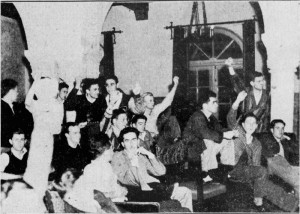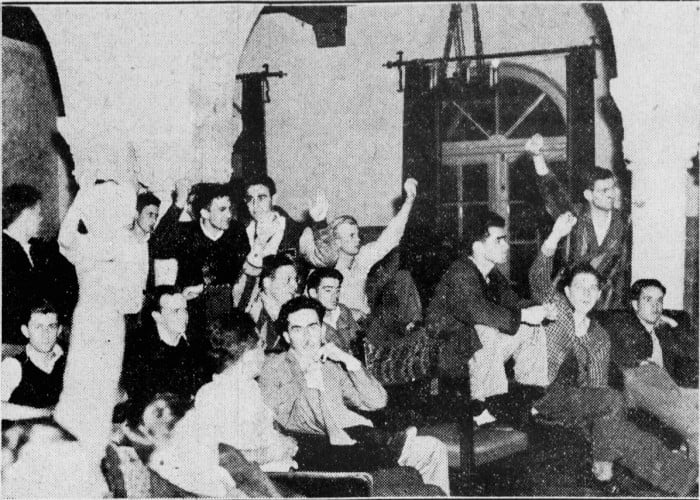In recent years, controversy regarding ASSU elections has typically surrounded endorsement groups on campus. But beginning in 1934, Stanford’s political scene revolved not around endorsement groups, but around two political parties — “Hall” and “Row” – based in residential life. The Daily article below, originally published on April 30, 1936, describes student discontent with that caucus system, which ended in 1942. An early history of ASSU politics, published in 1949, can be found here.
Rouble Leads Denouncing Of Caucuses
‘Power Too Great,’ Says Ex Committee; Women Plan Special Election
By DAVE BOTSFORD
In what was described as a “move toward democracy in Stanford student government,” Ex Committee last night officially denounced the political power wielded by organized partisan caucuses.

Though the committee has no power to outlaw Hall and Row nominating meetings, the legislative body made it clear that “no candidate should feel honor-bound to caucus tickets nor voter to living group affiliation.”
Rouble Leads
Graduate Member Larry Rouble, a power in Hall politics, instigated the action because, he said, “these caucuses allow small groups to force out good candidates and are therefore a detriment to student government.”
Even though Rouble and Joe Weiner, another graduate member, favored a joint Hall-Row caucus when the idea was suggested at the Toyon meeting Monday night, both agreed last night that a general nominating assembly would not solve the current, problem.
Caucuses Defended
“Caucuses tend to distribute good men all down the line,” Student Manager Chuck Fontius argued. “If there was no previous agreement, all the best men would run for student-body president.” Rouble did not agree.
“People aren’t satisfied with the way nominations are running now,” he said.
The “rat” or “bad boy” feeling against nominees who run without caucus sanction was hit as “undemocratic.” The Committee, in its attempt to break the power of the caucus, advised anybody to “go ahead and run. The power of the few must be broken.”
Power ‘Too Great’
Jack Calderwood, junior man, argued that the caucus system would not be eliminated by such a decree because the factions needed some method of nominating candidates. Ex Committee, however, felt the present power of the caucuses was “too great.”
The fact that nearly every member of Ex Committee was elected through the power of a caucus at a previous election was brought out by Rouble when he admitted that “maybe this is stabbing somebody in the back.”
Supervision Suggested
Official supervision of caucuses through the election board was suggested momentarily by Bill Quade, Men’s Council chairman, but Fontius declared such was outside Ex Committee’s power.
“This Hall-Row feeling is just a state of mind drummed up before every election,” Barbara Kimball, Women’s Conference chairman, declared. “It’s unnatural and these caucuses make it worse.”
Meanwhile, the rest of the campus’ politicians were busy up the Row knifing and counter-knifing candidates for the Row ticket.
Other student-body business included:
WOMEN’S ELECTION: Instead of electing a vice-chairman and secretary of Women’s Conference next Tuesday, women voters must first pass an amendment empowering them to elect these extra officers.
Previously elected by the Confercnce itself, the two posts will be filled at a special women’s election within two weeks. A constitutional technicality prevents putting them on the general ballot.
B.A.C. REPRESENTATIVE: Larry Rouble will fill the vacant B.A.C. post until a successor to Roger Munger is elected next week. Munger did not return to school this quarter.
ASSEMBLY REGULATION: The ‘Student-Faculty Relations Committee was handed the job of working with the Administration’s Public Exercises Committee in planning Tuesday evening lectures, and other group meetings.
DATES GRANTED: Inter-club Council, exchange dinner and jollyup, tonight; Pi Delta Phi, motion picture, April 14; Toyon Club dance, April 17; Phi Lambda Upsilon, smoker, April 21; Oaks spring formal, April 24; Dramatic Council spring play, May 1.
Glee Clubs concert, May 5; Sigma Nu baby party, May 7; Class of ‘40 informal, May 7; Phi Sigma Kappa dance, May 7; Union Club informal, May 8; Japanese Club jollyup, May 8; Delta Upsilon informal, May 8.
